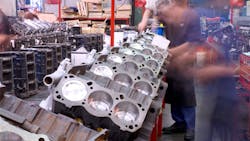5 Tips For Surviving a Sudden Spike in Manufacturing Demand
North American manufacturing has suffered a tough few months, but not all sectors are struggling. U.S. automaker Ford is cutting short the traditional two-week summer break to boost production amid outsized demand for its newest trucks and SUVs.
Fortunately, Ford isn't the only with the good problem of figuring out how to meet a sudden spike in demand. In May, U.S. manufacturing activity rose to 52.8 last month versus 51.5 in April, reports the Institute for Supply Management. In Canada, the RBC Canadian Manufacturing Purchasing Managers' Index, or PMI, rose to 49.8 from 49.0 the month prior. Any score over 50 signals growth, which, in this case, means that most North American facilities are scrounging for capacity to fill orders. Here are five ideas for taking advantage of the upside without overcommitting:
1. Enlist your top performers. Managing a spike in work is no small feat. Rally your top performers across the line to assess what projects you have, what can be put aside, and what needs to get done right away in order to make room for the new project. Take their input seriously and don't push for unreasonable deadlines. Instead, solicit ideas. Ask how they'd fit the work into the current schedule. You might be surprised by their creativity.
2. Embrace your specialty. What if certain sectors of your industry are recovering and your peers can't handle the work? Don't be quick to jump in. Instead, return to your specialties. Look at the numbers. What types of projects are most profitable for you? What will cause the least disruption on the factory floor? Work isn't what you want; good work is. Hold out for it if you must.
3. Avoid the wrong kinds of projects. Sometimes, the right market and the right client still can't offer the right kind of project. Don't book work for the sake of filling the ledger. Instead, insist on work that's easily addressed by your current team and current equipment. Avoiding stretch projects in which you'll have to invest heavily in order to generate a return can mean the difference between cashing in on sudden demand and overbetting on unfulfilled promises.
4. Revisit your recognition practices. Once you've determined the type of projects your factory is best suited to stretch for, look at your recognition practices. Are you putting in place systems for recognizing those who will put in the extra hours or learn the new skills required to cash in on the new business? Even a simple "thank you" or a handwritten card can suffice; the important thing to remember is that workers need to know you understand the extra effort they're putting in.
5. Develop one-off incentives. Workers also expect to share in the spoils. Let them. Develop one-off rewards that are tied to achieving specific, tangible production goals. Then, make good when workers do. If it's incentive pay you're offering, add it to the next paycheck. If it's a gift card, put it an envelope that night. Be as timely with rewards as you are with recognition and workers will come to see themselves as more than members of the line; they'll see themselves as contributors to the business.
Manufacturing is a cyclical business, and the wheel is turning faster than ever. Keeping strong relationships with your floor can help mitigate the chaos. When a rush of new work comes in, remember to enlist your top performers, focus on your specialty, take work that allows you to succeed, and then recognize and incentive great output. You won't avoid the stress of the spike, but you'll be more likely to come out ahead as a result of it.
John Mills is executive vice president of Business Development at Rideau Recognition Solutions, a global leader in employee rewards and recognition programs designed to motivate and increase engagement and productivity across the workforce.
About the Author
John Mills
Executive Vice President of Business Development
John Mills is executive vice president of Business Development at Rideau Recognition Solutions, a global leader in employee rewards and recognition programs designed to motivate and increase engagement and productivity across the workforce.
